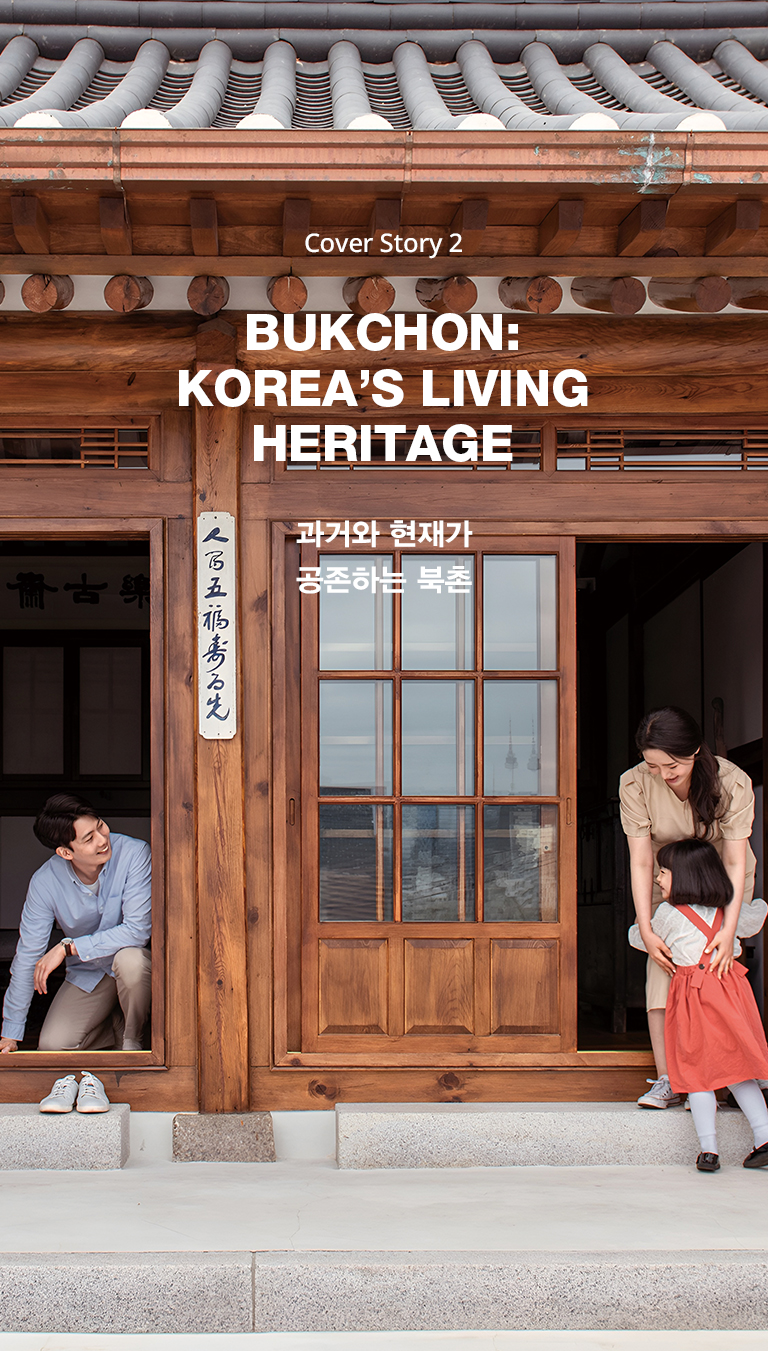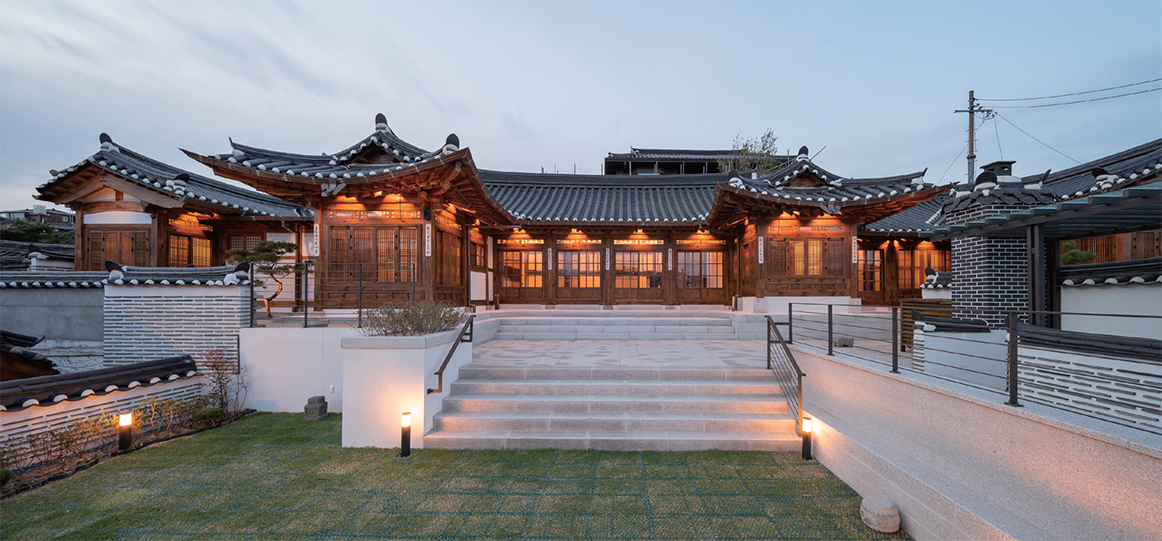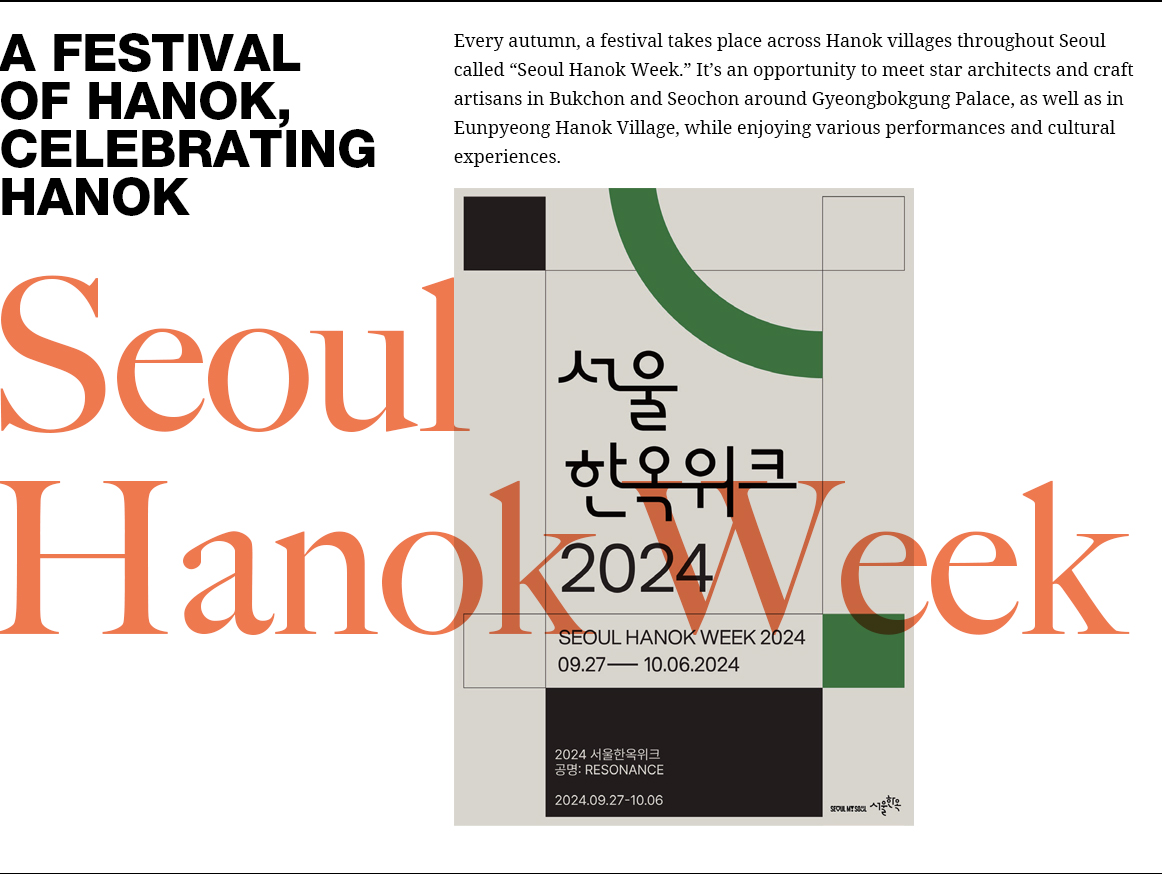
In the heart of modern Seoul, amidst soaring skyscrapers, lies Bukchon, a village that feels like a 500-year-old time capsule. Once home to Joseon Dynasty aristocrats, its Hanok now blend tradition with modern life as creative spaces filled with cultural content.
고층 빌딩이 가득하고 빠르게 변화하는 서울의 중심에는, 500년 전으로 돌아간 듯 한옥으로 빼곡한 마을이 있다.조 선시대 양반가들이 모여살던 ‘북촌’이다. 이곳의 한옥은 전통을 잇지만 과거 주거 기능에만 머물지 않고, 문화 콘텐츠를 품은 창의 공간으로 탈바꿈했다.
Writer. Sung Ji Yeon
Photos courtesy of. Seoul Metropolitan City
Seoul’s first Public Hanok, this multifaceted cultural space hosts diverse programs including traditional culture classes, exhibitions, hands-on experiences and performances. Built in 1921 as the residence of Min Hyeong-gi, a financial secretary during the late Joseon period, this Hanok was designated as a National Registered Cultural Heritage. Traditional culture classes include calligraphy, tea ceremony, flower arrangement and gayageum (12-string zither), while craft workshops offer embroidery and gyubang crafts (traditional women’s crafts). The center also regularly hosts Hanok concerts, film screenings and educational programs about traditional architecture. Be sure to check their scheduled programs when visiting Bukchon.
This Hanok guesthouse offers panoramic views of Seoul’s charming cityscape, where traditional Hanok rooftops meet towering modern buildings in a distinctive skyline. The basement features a community room for locals and tourist information facilities, while the ground floor houses accommodations in a renovated 130-year-old Hanok. Here you can fully enjoy comfort and Korean ambiance surrounded by antique furniture and crafts that embody the essence of Korean aesthetics—the beauty of empty space and minimalism.
This workshop offers hands-on experience with fermentation, a fundamental aspect of Korean cuisine. Set in a Hanok with a charming courtyard and neat traditional rooms, the workshop conducts classes on making seasonal beverages and traditional liquors, as well as cultivating nuruk (traditional fermentation starter) needed for the fermentation process. The programs are designed for beginners and students alike. Currently, their makgeolli (unrefined rice wine)-making program for foreigners is particularly popular.
Serving as a public reception space for visitors to Bukchon, this venue provides accommodation guidance, local tourism information, introductions to hands-on programs and luggage storage services. It also specializes in Korean tea, tea-inspired beverages and desserts made with Korean ingredients. In addition, a tea sommelier offers a “Korean Tea Ceremony Class,” where visitors can enjoy the process of brewing tea themselves. The venue combines traditional Hanok features with modern design, providing both charm and comfort to visitors.



Seoul Hanok Week is a festival featuring diverse programs and events to enjoy Seoul’s Hanok in many different ways. This festival, organized together with Hanok-related institutions, organizations and residents, makes your time in Korea even more special.
This year’s Seoul Hanok Week runs for 10 days from Sept. 26 to Oct. 5. It takes place simultaneously across Seoul’s major Hanok districts, including Bukchon, Seochon and Eunpyeong Hanok Village.
The festival offers five categories, with a total of 60 programs. There are exhibition programs utilizing gardens of Hanok, as well as neighborhood tour programs with Hanok experts or influencers. Opportunities to experience traditional Korean lifestyle are also offered, including traditional tea, seasonal foods, flower arrangement workshops and craft workshops. The festival also features Hanok concerts and performances with participation from residents and local organizations.
Last year, the festival attracted 35,128 participants and was hugely popular. The programs were diverse, including exhibitions showcasing the meeting of Hanok and contemporary art, woodworking experiences, local food tastings, traditional liquor tastings and storytelling humanities lectures. Participants expressed satisfaction with how the programs allowed them to explore the entire Hanok village area while discovering the deep charm and hidden value of these traditional structures.
Particularly, the docent program led by an architect who designed several Hanok in Bukchon had many people inquiring about additional registration on-site, so it’s expected to be very popular again this year.
While simply strolling through Hanok villages brings a unique feeling, exploring the architectural history and humanistic content within them will leave you with even deeper appreciation.
